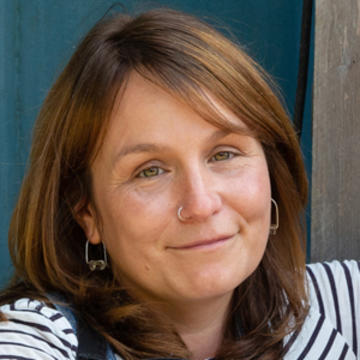Hanna Armitage, founder of Winterbrook Garden Nurseries

I am Hanna Armitage and I founded Winterbrook Garden Nurseries with my dad, next to his home in Brightwell, near Wallingford Oxfordshire.
I create all the artwork, growing of plants, buying of gift and plant stock, manage the nursery and run the website and all the social media! My dad works with me at weekends, sources all the garden antiques and salvage and takes care of all the practical aspects of the nursery from building things to also designing and making new areas within the nursery, thankfully he is very practical!
It is just us two at the moment as the business is so small, however, year on year we have increased our sales and are confident that the business will grow again this year.
What is your background? What made you decide to get involved in supporting entrepreneurs?
I am a former secondary school art teacher and previous to that I was a freelance print designer. I have always had a keen interest in print design from as long as i can remember, my parents are keen collectors of ceramics and garden antiques so it has come quite naturally to me too. I have always known that my work would sell but when trying to get it out into shops, i found the lack of control and places it could be sold very frustrating and so I decided that I could have my own work in a pop up shipping container and that’s how it started. Taking over the old plant nursery site and starting up Winterbrook Garden Nurseries happened by accident when I realised that people wanted a different type of shopping experience compared to that of the run of the mill big garden centres. Growing plants and designing illustrations of natural things seemed to go hand in hand.

For me entrepreneurship is taking an idea or instinct and running with it!
How and when did you know your idea was good enough to develop it?
I think my dad and I both knew we had something that would potentially work when we opened the nursery with our own grown plants and peat free compost. Customers were telling us how pleased they were to find us and somewhere offering something different. Making a sustainable plant nursery was really, really important to us as we felt it was the unique selling point for us. Finding increasing ways of offering sustainable practical alternatives pushed us to think in new ways which has really worked for us and made the nursery a destination for customers looking for something different.
What would you say are the top 3 skills that needed to be a successful entrepreneur? Why?
I think you really do need to trust your instinct. I always know that if i like something, it’s very likely that someone else will too! Take a risk. If it’s not outside your financial limits, I feel it is worth a risk to try something new or unusual. My dad was very sceptical about us being a peat free compost nursery but I was certain that it was the right thing and now it’s one of the main draws of the nursery and bestseller. Don’t try and do everything by yourself! Ask for help and talk through your worries with loved ones. Sometimes when you are knee deep in a business it is hard to see the bigger picture and all the things you have achieved.
What is your favourite part of being an entrepreneur?
I love being my own boss! Making decisions and being able to go with them, making a business that works around my family so I have the work life balance I need for my young family. I love our customers and meeting them for regular chats in the nursery! I enjoy all the practical sides of my job and being still being able to produce my artwork in the seasons the nursery is closed.
What individual, company or organization inspires you most? Why?
I am very inspired by David Ware who setup Edible Culture in Faversham, Kent. I first saw him when he was featured on Gardeners World back in 2018. He was showing his nursery and how he had designed a plant pot that was made from cardboard. After that I called the BBC and found him to ask him all about his cardboard PosiPots as I was desperate to use them on the nursery and eliminate the traditional plastic plant pots.
If you had 5 minutes with the above individual/ company/organization, what would you want to ask or discuss?
I would have a lovely brainstorm discussion with David, coming up with more ideas and ways we could make horticulture more sustainable in the mass market and garden centres.
What has been your most satisfying or successful moment in business?
I was really pleased when we were chosen for Small Business 100 as I had submitted an amateur film on my phone about the nursery!
What would you say have been some of your mistakes, failures or lessons learned as an entrepreneur?
Lessons learnt are to keep to your ideas and passions. Because i am younger than your average nurseryman, lots of people assume I don’t know anything or try and persuade me to do/sell things I don’t think are quite right. It’s very hard to stick solid and stand up for your opinion but I am learning. When I make a mistake it really bothers me but I know in the end that i have learnt from it and i won’t do it again.
How have you funded your ideas?
We funded the nursery by selling off plant stocks that were left on the nursery site when the previous tenant walked out. We nursed all the plants back to life and had a big sale to try and make some capital to invest into our own new stock. We continue to keep investing back into the nursery and it is paying off. When it comes to funding buildings, we have just re-used what materials we have. Our main investment is on plant stocks we don’t grow onsite and gift stock.
Are there any sector-specific awards/grants/competitions that have helped you?
Being selected as one of the Small Business 100 in 2020 was definitely a massive help to us getting some press and PR. The advice and mentorship via Small Business UK is brilliant and I was offered lots of opportunities I would not have had if we hadn’t applied, I even went to the House Of Lords!
What is good about being an entrepreneur in Oxfordshire? Bad?
Oxfordshire is a beautiful place, with lots of wonderful places to see and visit so I think we are very lucky to run a business here. Oxfordshire residents love their gardens and plants and they are also very supportive of small businesses around and about. Customers from Oxfordshire are very loyal!
The bad parts are planning permission and the outdated views the councils can have about new ideas and pop ups, sometimes it seems like a real fight to get simple things approved because we live in such an outstanding area.
If a new entrepreneur or startup came to you looking for entrepreneurship resources, where would you send them?
I would send them in the direction of Small Business UK and definitely get them to apply for the Small Business 100 as you get so much advice. They offer a wealth of support and advice in an online Facebook group specifically for businesses starting out.
Have you faced any challenges as a woman entrepreneur? If so, how have you overcome them?
Being a young woman, thee have been times when I have not felt I have been taken seriously. To overcome it i just make sure that I have all my research and information so I be confident in sharing my opinion or ideas.
What resources would you recommend for other women?
There are lots of groups and networks locally that offer specific help and support to women in business, you have to get yourself out there and join things.
Do you have any advice specifically for other women who want to be entrepreneurs?
Keep strong with your ideas and instincts!
Any last words of advice?
Allow people to help you and designate tasks. If you are overworked and stressed 100% of the time you start making mistakes so it is best to be human and make sure you have a work – life balance. I always switch off the work phone when I am not physically at work, else I get sucked in to working 24/7 which I know doesn’t bring out the best in me!
Share this
More news



